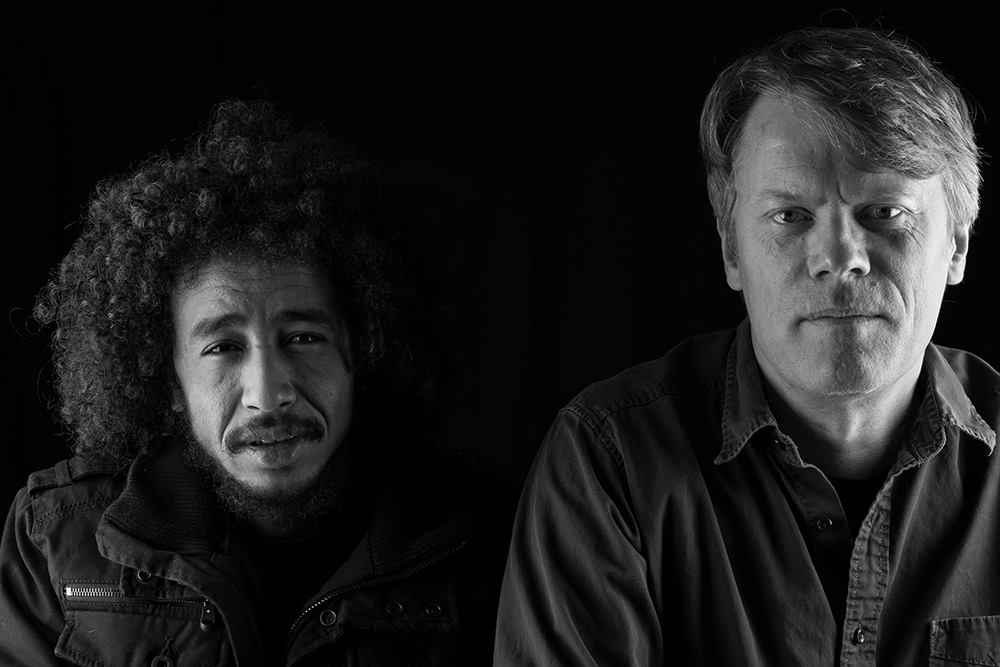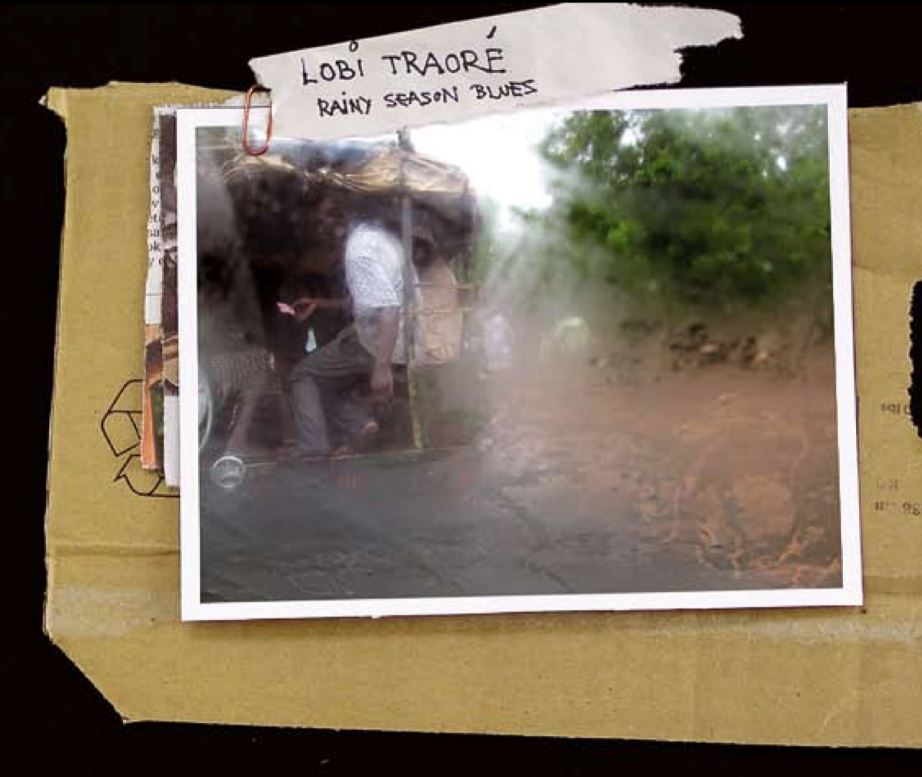
Awarded five time in a row as label of the year at the Womex 2014, 2015, 2016, 2017 and 2018 the young label Glitterbeat has now spread its wings. Interview with musician Chris Eckman, one of the label’s two founders about the birth and spirit of an adventure born in Mali.
Updated on October 15th, 2018
 Listen to the Glitterbeat playlist
Listen to the Glitterbeat playlist
Can you explain how you got involved in Glitterbeat, a label born in 2013
It’s not something that happened like… like we woke up one day, and we decided to start a label. I started going to Mali, about 10 years ago, just as a traveler looking for new musical experiences, not really to play but I was more interested to go there as a listener. I was just trying to learn about music I guess. I needed to go to some place I had never been before and listen to traditions or musics I hadn’t experienced. So I went there for about 4/5 weeks…
Why Mali?
A friend of mine in the late 90’s had gone there to do some field recordings, and he released this field recordings on a label out of Seattle -where I’m from originally- called Sublime frequencies. My friend released two albums for them, one was done in Morocco, the other one in Mali. When he came back from Mali with the recordings, the music was quite new to me. I had been listening to African Music for years and years but mostly Nigerian , Ghanaian, more beat-oriented African Music. So it was something very different to my ears and I sort of became obsessed not only with the music but with the Idea of going there and visiting. So that was my introduction.
So out of this trips I started going there with friends, with a good friend of mine called Peter Weber who for many years has owned this German label called Glitterhouse, and through this trip we met a young group from Kidal called Tamikrest, and through that meeting, we ended up doing a collaboration. Peter endend up to be manager for Tamikrest and, little by little, after we had done this and I had gone back a couple of times to produce a few more records with other artists, we decided to start a label to release this music. Our goal at first was more or less to release the music we were producing there. Peter and I have been friends for many years, we thought that maybe we could make a sublabel to Glitterhouse specialized in this music from Mali that we were very obsessed with and for about a year we were associated with Glitterhouse and then we set up our own company.
We took it step by step : we didn’t have this sense that we were going to start a label.
The music of Mali was very different, what did catch you so much (Mali is very present in Glitterbeat’s catalogue)
CE: Mali is where we started with, the music we knew, the place where we had made some friends. It all developed very naturally, we weren’t running around Mali trying to sign bands, and trying to be record company people, we took it step by step : we didn’t have this sense that we were going to start a label, we were just meeting artists and some of them asked us “would you like to produce the record ? can you help us get labels?”- we said “yes maybe”, and the relationship started on this basic level.
But the thing with Malian music -although it’s a very diverse music- but throughout the country there is a relationship to what we know as “pentatonic scales” and “blues”. To people that are well aware of African-American music, the connections are obvious. This music travelled from that region to the islands in the Caribbean and then onwards to the shores of Northern America and it has come back in a way. So there is a sense always of this familiarity merging with a music that is quite unfamiliar at the same time. It’s a strange middleword between these two things, I think, for the western listener. And I think that’s what attracted me to it.
Talking about your encounter with Tamikrest, their first album Adagh was relased on Glitterhouse?
At that point we didn’t have Glitterbeat. Because Peter owned Glitterhouse we started to release the album through his label. It was a very strange new kind of music to be released on Glitterhouse, but It was the shortest line between A to B. It was also a way to be sure things would be done right in terms of legal contracts, and things like that… Peter was being also protective about the situation, because the guys in the band were really young, in their early twenties, and they had no experience outside of Africa at all. I was with Ousmane (Tamikrest’s leader) the first time he was in Paris, in Berlin, in Europe. It was a huge adventure for them and something that, if you have lived in the desert for your life, was quite a shift of perspective. I was producer of the first three albums of Tamikrest. The first one Adagh, we recorded it in Bamako in this quite famous studio called studio Bogolan (originally started by Ali Farka Toure). They were an interesting group, because, as much as they came from the middle of nowhere, and Kidal is really in the middle of nowhere, there was a place there called Maison du Luxembourg financed by the Luxemburg government, and they had a very small laptop studio set up. And when we met them they said they had some songs recorded, and when they sent them to us I was surprised, I was like : “Wow !” They’ve actually done some studio recording with overdubs…
So when we recorded in Bamako they were quite aware of how the process worked, and they were leading te process as artists always should. So it was a great experience, we worked very fast and I think we recorded the album in five days. It was a joyfull experience.
You talked about blues, but in certain Glitterbeat’s productions you also can feel a strong rock’n’roll touch…
Artists in Africa know so many things ! For example Ben Zabo has a very deep understanding of rock music, he listens to rock music himself, hence the sound of his album : again it was made quickly, so there was no chance to change the vision or the assemblage of the band.
I was there as producers often are, just to make sure that the car doesn’t drive off the road. As long as the car stays on the road, you just stay out of the way, you let the band do what they do well. Tamikrest is the same, the rock influences on their records has nothing to do with me : they love Dire Straits, Carlos Santana, Jimi Hendrix… they‘ve listened for years to Bob Marley. This conversation with rock music and now with electronic and hip hop music is a long established dialog in West Africa. It’s not something that is by nature or by definition brought by Western producers or record companies telling the band to add drums to their songs or things like that. That’s how the music sounds like when they are making it!
My job is to clarify the sound, make sure that the vibe in the studio is great, that everybody is relaxed, that the songs seem to be functioning.
I’ve produced maybe fourty records for other artist over the years, maybe seven or eight of those in Africa. And everytime I do the same way : the idea is that it’s the artist’s record, not my record. My job is to clarify the sound, make sure that the vibe in the studio is great, that everybody is relaxed, that the songs seem to be functioning, but as far as re-creating the material from the ground up, that was never what I saw my role as, as a producer, whether in Bamako, in Ouaga, in Seattle or in Slovenia where I live now. There are a lot off approaches, but mine was always that it needs to be artist- driven.
On what criteria do you choose the artists?
Since four years, we’re not a Malian based label anymore, we work with artists from Brasil, the Us… but now, unlike the first years, a lot of artists come to us. I think we are just looking for stuff that we would go into a store and buy. And we never lost that. Probably after four years we’re more confident about this approach than ever actually.
Can you tell us about Lobi Traoré’s record, that came out in 2010, after his death?
Lobi is a great story. I saw him on stage on the third time I was in Mali and I was just thrilled, the show was even better of course that I expected. And yeah… At that time we were making the Dirt music* record, and he said we would come to the Studio. Well, we were thrilled about this. And the next day he was coming to the studio… to make his record ! He was ready to go ! So I had to explain to him that we had to finish our record first.
When I came back to do the Tamikrest record six months later, he heard that I was coming but I was there for a very short time and it was very clear there was no time and not even the money to make a band record. So I propose to him : may be just come buy with your accoustic guitar to do like a really raw … “Johnny Hooker sitting in front of a microphone”. He came and it is still to this day one of the most remarkable thing I ever saw. He sat down on the chair, he didn’t move :
“- Do you want some water? No.
– Do you want to have lunch? No.”
He recorded for two hours straight, then he had to go to a wedding, and… we had a record.
Unfortunately it was a strange feeling because literally the morning that I got the finished artwork for this album “Rainy Season Blues”, I got an email from a Malian DJ who’s on the radio in the UK and he told me Lobi had died. I was just going to send Lobi the artwork so that he could take a look at it. It was a very strange, surreal situation, but yeah, I feel lucky to have worked with him at some level. The record came out in 2010.
Whit the years, Glitterbeat has broadened it’s palet, going far from Africa…
Music… Culture by nature is always a hybrid. People often have this idea that cultures are pure, but anybody who thinks about it more than twenty seconds, with an open mind, will realize that cultures have always been changing. Maybe they are changing faster now, that’s for sure, digitalization and the level of communication we have of course leads to that but, we are always thinking about this golden moments when cultures were better and more pure, and etc… but this was probably never the case, you know they have been playing electric guitars in the Congo since the 50’s! We can never stop the conversation between cultures and that’s a good thing. There’s nothing more fascinating to musicians than to play with people that are coming from a different angle that they are used to. And one of the sad things about these collaborations is that if some guy from France or the US goes to Bamako and plays with some musicians there, it’s automatically considered like “why don’t they just leave these guys in Mali alone? Let them play their music…. Yeah, I’m sure some of these collaborations are not been done on a very fair level, but when I talk with Ousmane he says : “do you think Robert Plant can sing on our record ?” and this kind if things. Musicians that have open minds they want to play with other musicians that have an open mind : it’s not really that important where they come from , the music that can be made is exciting… and music based on the roots is also fine. They can coexist together, I think we are in a stronger place when all of it does exist, or coexists.
It’s long over due that we start to abandon these ideas of World Music.
So I guess you’re not very keen on the “World music” concept?
Well, I never liked this term very much, I think it’s something that we felt right at the beginning when we started Glitterbeat .. I think there was probably a time when this concept of worldmusic made some sense, it was a time when the really well intentioned and inspired people in the music business wanted to broadened the palet of what was listened to in the Western countries, and they felt that if they put a lot of this music together it would be easier to interest people. I think we’re well passed that stage and it’s long over due that we start to abandon these ideas, because you can see it every day : Africa itself is urbanizing very quickly, the music in urban Africa is becoming more and more conversent without any record company like Glitterbeat or producers like myself standing in the middle. It’s becoming more and more conversent with global sounds and global trance, and no one is going to stop that, that’s just going to happen. The digital world that we live in speeds us along, and it’s going to be where we go and at this point we just have to say that artists that are releasing their music themselves (on bandcamp or whatever) are contemporary music artists. I think we should show them more respect than that actually. There is a lot of people that have the same feeling that it’s just time to say: this is music from now, it just doesn’t come from Berlin or London or any other European or American urban place, but it comes from Cape Town, Nairobi or Hanoi, and it’s just music that’s being made today, by contemporary musical artists.
Read next: ‘Quebra Cabeça’ by Bixiga: São Paulo’s band integrates urban sounds into their afrobeat
Top picture : Ousmane Mossa (Tamikrest) et Chris Eckman. Ljubljana, November 2013. Photo by Jaka Babnik






